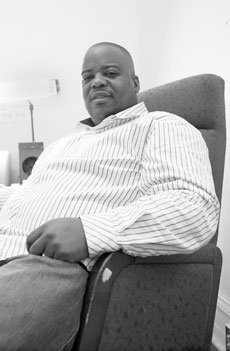Professor brings hip-hop to the classroom

Online Poster
February 10, 2005
The classroom might be the last place many would expect to find hip-hop music. But William Patterson, associate director of African-American Studies, has introduced hip-hop into his teaching and has helped shed light on hip-hop education and research in the higher education community.
Patterson, a life-long resident of Champaign-Urbana, has been involved in community activism and helping young people since the mid-1980s, when he worked for a summer camp at King Elementary School in Champaign.
“I was raised around activism,” Patterson said. “My mother was a strong activist. She was politically engaged.”
He became a visiting professor at the University after getting his doctoral degree in educational policy studies at the University in 2000 and was named associate director of African-American Studies in August 2004.
During his time at the University, Patterson has taught several classes including Black Leadership Development and KRS-1: Hip-Hop Artistry and Social Activism. He is currently teaching a course titled CREAM, or Cash Rules Everything Around Me. Patterson said the course is a spin of a Wu-Tang Clan song about money in society.
Get The Daily Illini in your inbox!
“My thoughts were that we could really examine the formation of new forms of wealth streams and class within the context of hip-hop culture through this course but also look at it through a racial inclusion/exclusion perspective,” he said.
Candice Cobb, senior in LAS, has taken three classes under Patterson, including CREAM, and said he is different than most other instructors.
“He’s encouraging, and he’s real friendly,” Cobb said. “He’s easy to relate to; he relates because of his background.”
One thing that helps Patterson relate so well to his students is his willingness to use the context of hip-hop in his classes. It is important to study hip-hop culture because it is the “current text” for many students, Patterson said.
“I’ve watched students that I know have a hard time … to mainstream themselves into traditional classroom structures,” Patterson said. “But within the context of hip-hop, you’re able to have a dialogue within the terminology and the language of the culture they are custom to engaging in and then making it relevant to the lesson.”
Alexander Skolnik, sophomore in LAS, said Patterson focuses on dialogue with students in his classes.
“He strives to get the students to come up with their own ideas,” Skolnik said. “At least in my classes, you’re not (going to see him) just giving a lecture.”
Encouraging classroom discussion is important because it helps ensure that students understand the material and see if the lesson plans are working, Patterson said.
“It creates the type of communal environment where thinking, and expression is welcomed and supported,” he said.
When students come to him, Patterson is willing to talk, because he is interested in their ideas and can sometimes help them by relating to his own experiences.
“I’m a kid from the streets, and so I understand a lot in terms of street culture when you feel ostracized,” he said. “I bring the spirit that despite your setbacks, you can always decide to make change, but you have to work towards that.”
Skolnik said Patterson has taken an interest in him as a person and agreed that he is easy to relate to.
“I would consider him not just a professor but a friend,” Skolnik said.
As a scholar, Patterson has remained a strong advocate in the community as well as an influential mobilizing force on campus. He is currently working with WILL radio in Champaign to teach middle school girls how to create community archives by researching desegregation in their community and making a radio documentary and a Web page.
Patterson also developed a program called BEATS, Bridging Education Arts and Technology Scholastically, in Urbana Middle School to help students use their culture in their daily lives to create school pride.
“Students who weren’t part of the mainstream school culture still want to participate and think schools are cool,” he said.
Preston Williams, deputy superintendent of curriculum and instruction for Urbana School District 116, has worked with Patterson on a number of issues, including interim education on youth and non-violence and helping district staff and faculty to understand the hip-hop culture.
“I think any community would be really glad to have him,” Williams said.
During the controversy over the tapes of Champaign police race relations, Patterson helped organize a town hall meeting for students and community members to discuss the issue. Patterson grew up with both men who made the film and said the town hall meeting sparked a lot of discussion about police and race relations.
Nameka Bates, assistant director of the African American Cultural Program, has worked with Patterson to organize various town hall meetings, among other things.
“He’s a very passionate man,” Bates said. “Students latch on to positive male role models, and that’s what Dr. Patterson does for them.”
Patterson said the University community has been a good environment to work in thus far.
“I think that on this particular campus, we’ve made a lot of headway to spark the dialogue about how to institute hip-hop from a research perspective and within the University,” he said.
Patterson hopes the University will develop a center for the development of hip-hop culture on campus in the near future and has been discussing the idea at the University.
He said he hopes to see more African-American students and faculty on campus in the coming years.






